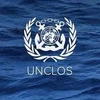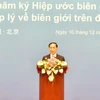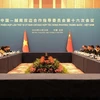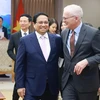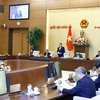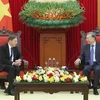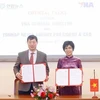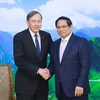Beijing (VNA) – In a fluid world full of imminent risks and challenges, countries have no better choices than cooperating sincerely and substantively with one another, and harmonising their own interests with regional and international interests.
Sen. Lt. Gen. Nguyen Chi Vinh, Deputy Defence Minister and a member of the Party Central Committee of Vietnam, made the remark while addressing the seventh Xiangshan Forum, which is taking place in Beijing, China, from October 10-12.
In a speech themed “Role of Militaries in Global Governance”, a focus of the forum, Vinh said global governance includes cooperation mechanisms in the region and the world to govern the world better.
Those cooperation mechanisms not only help countries seek opportunities to develop together but also cooperate closely to harmonise their own interests with those of the region and the world, and adhere to international law and common rules so as to bring about fairness and interests to all parties.
He said it is necessary to promote the sense of responsibility and the role of different factors, including militaries, in cooperation to deal with global governance issues.
The role of militaries at present is not limited to protecting independence, sovereignty, territorial integrity and interests of their nations, but also includes enhancing cooperation to ensure a favourable environment for common peace and stability, building up trust and capacity, while together exercising self-restraint, controlling tensions and preventing conflicts to resolve disputes.
Militaries, in fact, are striving to do so, he added, noting that more and more countries, including Vietnam, are joining in the UN peacekeeping operations. Additionally, defence-security cooperation in Asia-Pacific is developing strongly, especially within the last decade, with such regional cooperation mechanisms as ASEAN Defence Ministers’ Meeting, ASEAN Defence Ministers’ Meeting Plus, ASEAN Regional Forum, Shangri-La Dialogue, ASEAN-Japan Forum, Seoul Forum, and Xiangshan Forum.
All of them look to foster the formation of strategic trust and common perceptions on emerging security risks and challenges, and create effective cooperation mechanisms, Vinh said.
He stressed that as a country with increasing power and wealth, the host nation should cooperate more closely with the international community and the region, play a more active and responsible role in international cooperation, contribute to global governance on the basis of respecting international law, and align China’s interests with the common interests of the region and the world.
By doing that, countries can have more security arrangements and agreements for the region, more support for international law and the signed agreements such as the Declaration on the Conduct of Parties in the East Sea (DOC) between China and ASEAN, and support for the expeditious finalisation of a Code of Conduct (COC) in the waters in order to maintain law, peace, and stability in the East Sea, as well as in the region and the world, the official said.
Themed “Build a New Type of International Relations through Security Dialogue and Cooperation”, this year’s Xiangshan Forum attracts nearly 400 military officials and specialists from around the globe. It focuses on responding to new security challenges in Asia-Pacific through cooperation, role of militaries in global governance, maritime security cooperation, and international terrorist threats and countermeasures.
The event, first held in 2006, is co-hosted by the Chinese Association for Military Science and the China Institute for International Strategic Studies.-VNA


















